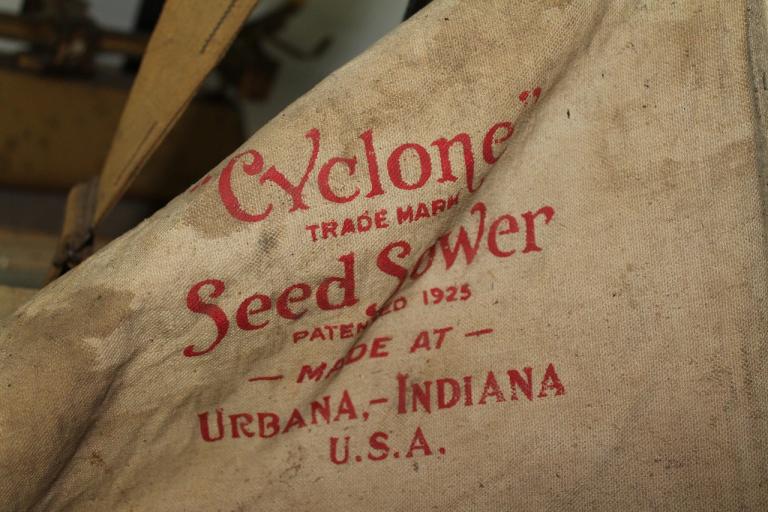Regular classes for the spring semester ended last Friday–semesters seem to go by more quickly every year. At the end of each academic year, I often reflect back on the past few months for permanent takeaways, experiences and students that will remain with me long after the classes are forgotten and the students have graduated. Being a college professor (and, I suspect, being a teacher of any sort) is a lot like the parable of the sower in Matthew’s gospel. I throw the seed out there indiscriminately on a daily basis, hoping that on occasion it will land on receptive ground in which it can grow.
This is an entirely non-economical and wasteful activity, especially since it sometimes takes years for academic seeds to germinate. I often will never find out where the scattered seeds took hold. But sometimes I am fortunate enough to see the seeds germinate and sprout in real time—it’s enough to balance out any number of seeds that have fallen on rocky, thorny, or sandy ground and died.

Today I’m thinking of a student who graduated two years ago during the height of the pandemic; her class of 2020 was robbed of all of the graduation events that are intended to mark and celebrate a job well done. Charlotte (I’ve changed her name for obvious reasons) took three different classes with me, one each in her freshman, sophomore, and junior years. Charlotte is one of those students that every professor would like their class to be filled with. She did the work, sat in the front or second row, and had one of those attentive faces that makes the teacher feel as if what she or he is doing actually matters. Charlotte was a solid B/B+ student, but will take more from her education than many straight A students do.
The final course Charlotte took with me was “Contemporary Women in Philosophy,” focused on the work of Simone Weil, Iris Murdoch, and Marilynne Robinson—three very different thinkers whose work intersected in a number of unpredictable and interesting ways. A continuing writing assignment throughout the semester was the “intellectual notebook,” in which I ask each student, at least once a week, to choose a passage of no more than three or four sentences from the week’s assigned readings and reflect on their chosen text, making connections to other courses, their own lives, and current events as they wish. The one thing not allowed in intellectual notebooks is a book report—I have read the texts many times and don’t need a student to explicate them.
I’ve often told my colleagues that this assignment has, over the dozen years or so that I’ve been using it in many of my classes, produced the most interesting and powerful student writing I’ve ever encountered. That sets the bar high, but on occasion a student or two will go even higher. Charlotte was one of those students. Her notebook entries were honest and revealing; I was able to track in real time the impact that the course materials and class discussion were having on her. In her last entry of the semester, she reflected back on her class experience at length—here’s what she wrote. I have formatted her thoughts for easier reading, but the content is unedited.
I have experienced so much enjoyment during the course of the semester studying the philosophies of these three contemporary women. Thinking about these ideas: art, morality, love, relationships, attention etc. all remind me that there is so much more to philosophizing than what the ancients conceptualized about. Ethics, virtue, democracy, politics; these things are valuable but these are not the end all and be all of philosophizing. The women have studied have brought a new style of thinking to the forefront of my mind.
It is hard for me to choose which woman I connected with the most. I don’t know where this level of connection or deep relatedness stems from but I feel it with each of the women. Weil and Robinson seem to have spoken to the inner part of my personhood that I did not know how to name and Murdoch, too was able to challenge me and my own actions as a real person combating what it means it be moral, daily.
On one of the first days of class, you called on me and said, “say something profound, Charlotte.” This stuck with me. This small demand is something I have remembered and have taken to almost every aspect of my life. It is a reminder I am grateful for. With all that I say, maybe if it is not always profound, it should be damn interesting.
I feel as though my heart, my soul, the God in me, knew this to be true, knows this to be the case, so it was not so much a matter of learning it, but rather of being reminded of it. That is how a lot of this class was for me, putting my emotions, my instincts, my inclinations into words.
I am joyful about learning. I am excited by the opportunity. This class was not one where I struggled to memorize information, but one that I will fondly and easily recall and remember. My notebook often was filled with beautiful lines, like the small demand made of me during the first weeks and many others I cherish:
- I don’t have a right to an opinion, opinions are earned.
- Being comfortable is vastly overrated
- The idea of a vending machine God
- A God that changes with me at different stages of my life
- This wonderful feeling of understanding and being understood
- That having an inclination about a higher being is an acceptable way to go about my own religiosity
- The soul being like a salmon [A reference to this from Iris Murdoch: “Have you ever seen salmon leaping? Such fantastic bravery, to enter another element like that. Like souls approaching God.”]
- Dachshunds [My dachshund Winnie was a frequent topic of conversation.]
- Hoping that God has a sense of humor or we’re screwed
- Knowing that she (God) and I need some space away from each other but we will never be apart.
These are the lessons attached to me now. These ideas are what have worm-holed their way into my life, what I now carry, my shiny new academic luggage I can take with me on my next adventure. I have been endowed with the joy of learning; I study what I do not because of how much money I will make but what kind of person I want to become.
Thank you, for giving me the language and the minds to converse with. For allowing me the ability to react in an academic setting with emotions, to follow my intuitions, to stay creative and for presenting an environment of excitement and joy around learning. I will think of this often and remember it fondly.
It is testimonials such as these that, when I look back on my more-than-three-decade career in the classroom, remind me that when it comes to a profession and calling, I hit the lottery. I take no credit for the transformations that can happen in the classroom, other than for learning how, over time, to step out of the way and let something greater invade the space. One never knows what’s going to happen when the spirit of learning and growth steps in. But I am privileged beyond description to be able to witness and facilitate it.












